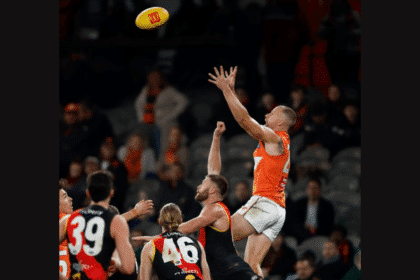Days before the first ball was hit at The Australian Open in Melbourne, a joint investigation between the BBC and Buzzfeed rocked the sporting world with claims 16 tennis players had been throwing matches.
And fixed gambling and odds meant those in on it would reel in the big bucks.
The investigation – which you can read here – didn’t name names, but it came at a time right before the world’s best were hitting the courts for Australia’s biggest tennis tournament.
When the scandal broke, Tennis Australia released a statement saying the tennis government bodies rejected claims evidence of match fixing was “suppressed” and there was a “zero-tolerance approach to all aspects of corruption”. They have provided the same statement for this article. Read the full statement at the end of this article.
No one was named in the investigation, but already some high-profile players have come out swinging against alleged accusations.
Lleyton Hewitt, who retired Thursday night after his loss to David Ferrer, on Friday morning flatly denied any match fixing claims. Novak Djokovic too has apparently been accused and has denied allegations.
We spoke to a couple of branding and PR experts to understand the impact the scandal has had on the brand Tennis Australia – the company behind the Australian Open.
The rumours are the hardest part to slay, said Geoffrey Stackhouse, crisis guru at crisis communications company Clarity Solutions. “And this rumour is particularly pernicious – partly because of similar scandals in cricket and soccer but mainly due to the credibility of the source. The BBC rarely gets it wrong.”
The cricket corruption scandal in 2000 saw allegations of match fixing by South African cricket players during the tour to India. Many were subsequently banned from the sport.
Tom Brigstocke, group CEO of strategy branding company Principals, also drew similarities between the cricket corruption in 2000 and the scandal currently ongoing. And at the time, it was the overall sport of cricket that suffered, he said.
“I’m not sure we have all the facts yet [of the tennis scandal] – but regardless it’s certain that a brand can’t recover until it’s generally accepted that the facts/issues are known and genuinely acknowledged by those in positions of responsibility.
“Look at the much discussed VW issues. Only after that can a road to recovery start to be planned with any credibility.”
However, branding company uberbrand reckons it won’t really affect the brand. “There’s been a history of scandals in sports and these situations will happen again over time,” said managing director, Dan Ratner. “However, we’ve seen that these scandals generally don’t effect the long-term brand equity of the associations or the players involved.
“For the majority of tennis players, they’ve built up credibility over a long period of time and this one negative impression generally isn’t enough to overcome all of the positive impressions of their personal brand.
“As for the Tennis Australia brand as a whole, they’ve had a long standing reputation for credibility and we hope this alleged incident isn’t harmful enough to change that perception.”
And while the gambling community took a hit in the scandal, this shouldn’t bother Tennis Australia, said Stackhouse. “Tennis Australia won’t give a toss about bent bookies, but they will feel the pain if the fans stay away in droves. Because that will hurt ticket sales and spook the sponsors.
“Luckily for Tennis Australia they may not feel the pain this time,” he added. “Most seats have already been sold and the average punter won’t fork out $300 for a pair of tickets just to stay home. And the lucrative corporate market was stitched up months ago.”
The rumours won’t go away by themselves though, he added.
“To lay the rumours to rest the International Tennis Federation will need a high profile and well publicised scapegoat to name and shame,” he said.
“They could also reassure the public by appointing a respected firm like Ernst & Young to audit their processes and declare them squeaky clean. Ideally suggesting a new set of safeguards for added confidence.”
Tennis Australia’s full statement
Statement from tennis governing bodies
FOR IMMEDIATE RELEASE
18 January, 2016 AEST
Tennis rejects suggestion evidence of match fixing suppressed
- The Tennis Integrity Unit and the tennis authorities absolutely reject any suggestion that evidence of match fixing has been suppressed for any reason
- In its investigations the Tennis Integrity Unit has to find evidence as opposed to information, suspicion or hearsay
- A year-long investigation into the Sopot match in 2007 found insufficient evidence. As the BuzzFeed report states: “the investigators had hit a brick wall. It just wasn’t possible to determine who the guilty party was in relation to this match”
- All professional players, support staff and officials are subject to the Tennis Anti-Corruption Program
- Tennis Integrity Unit-instigated anti-corruption investigations have resulted in 18 successful disciplinary cases including five players and one official who have been banned from the sport for life.
In response to match fixing allegations aired on BBC News and BuzzFeed online, the four governing bodies of tennis (ATP, WTA, Grand Slam Board, ITF) who are partners in the Tennis Integrity Unit (TIU), said today that there is a zero-tolerance approach to all aspects of corruption and that they are and will continue to be firmly committed to protecting the integrity of the sport.
Speaking on behalf of the partners, Chris Kermode, Executive Chairman of the ATP and Tennis Integrity Board member, said: “Tennis remains fully committed to meeting the challenge that all sports face from corrupt betting practices. We have stringent procedures and sanctions in place to deal with any suspected corruption and have shown we will act decisively when our integrity rules are broken.
“No player or official is immune from investigation, regardless of their status or position in the sport. Investigations follow where evidence leads” Mr Kermode said.
“All professional players, support staff and officials are subject to the terms of the Tennis AntiCorruption Program (TACP) which equips the TIU with substantial investigative powers. These include the right to interview any relevant person of interest and obtain their telephone, computer and bank records.
“No player or official is ever cleared by the TIU of potential involvement in corruption. By its very nature, corruption is difficult to prove, so while the process can often be lengthy, the TIU will continue to pursue evidence where it believes it is warranted.”
In 2011 the TIU opened an investigation into a player that was subsequently placed on-hold for lack of substantive evidence. When new evidence was obtained in 2013, the player was charged and found guilty of three breaches of the TACP. He was suspended for a period of five years and fined US$25,000. A subsequent appeal to the Court for Arbitration in Sport (CAS) in early 2014 was dismissed and the original sanction upheld.
“For four years the TIU continued to pursue this case; time and effort that was vindicated by removing a corrupt player from the game for a substantial period of time” Mr. Kermode said.
“We remain open and willing to upgrade any or all of the anti-corruption systems we have in place if we need to.”
In September 2008 the four tennis associations came together to streamline and strengthen corruption investigations becoming one of the first major sports to establish its own dedicated anti-corruption unit. The Tennis Investigation Unit is charged with enforcing the sport’s zero tolerance policy towards gambling-related corruption worldwide.
Since 2010, TIU-instigated anti-corruption investigations have resulted in 18 successful disciplinary cases being brought forward.
These prosecutions include five players and one official who have been banned from the sport for life.
Each of the 18 cases was a result of TIU-instigated investigations, rather than law enforcement or judicial prosecutions, or sting or entrapment operations.
Where cases have been appealed by players to the Court for Arbitration in Sport, the original period of suspension handed down by an independent Anti-Corruption Hearing Officer has been upheld.
This reinforces the robustness of the original investigation and the strength of evidence gathered by TIU. The TIU online anti-corruption player education program is mandatory and has been completed by more than 23,000 professional players.
“There are nearly 21,000 active professional players and over 2,100 officials, playing and officiating in over 1,500 tournaments in 80 countries around the world. The vast majority of these individuals are good people of high integrity,” Mr Kermode said.
“Unfortunately, there is always a minority who seek personal gain from corrupt activity. Those individuals will continue to be subject to investigation by the TIU and disciplinary sanctions which include lifetime bans and punitive financial penalties.”








